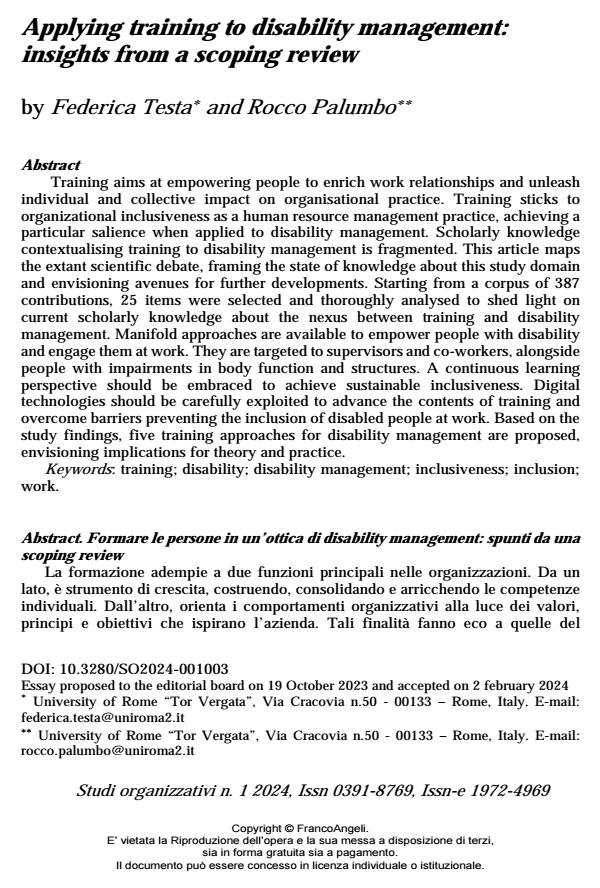Applying training to disability management: insights from a scoping review
Titolo Rivista STUDI ORGANIZZATIVI
Autori/Curatori Federica Testa, Rocco Palumbo
Anno di pubblicazione 2024 Fascicolo 2024/1
Lingua Inglese Numero pagine 37 P. 75-111 Dimensione file 1113 KB
DOI 10.3280/SO2024-001003
Il DOI è il codice a barre della proprietà intellettuale: per saperne di più
clicca qui
Qui sotto puoi vedere in anteprima la prima pagina di questo articolo.
Se questo articolo ti interessa, lo puoi acquistare (e scaricare in formato pdf) seguendo le facili indicazioni per acquistare il download credit. Acquista Download Credits per scaricare questo Articolo in formato PDF

FrancoAngeli è membro della Publishers International Linking Association, Inc (PILA), associazione indipendente e non profit per facilitare (attraverso i servizi tecnologici implementati da CrossRef.org) l’accesso degli studiosi ai contenuti digitali nelle pubblicazioni professionali e scientifiche.
Training aims at empowering people to enrich work relationships and unleash individual and collective impact on organisational practice. Training sticks to organizational inclusiveness as a human resource management practice, achieving a particular salience when applied to disability management. Scholarly knowledge contextualising training to disability management is fragmented. This article maps the extant scientific debate, framing the state of knowledge about this study domain and envisioning avenues for further developments. Starting from a corpus of 387 contributions, 25 items were selected and thoroughly analysed to shed light on current scholarly knowledge about the nexus between training and disability management. Manifold approaches are available to empower people with disability and engage them at work. They are targeted to supervisors and co-workers, alongside people with impairments in body function and structures. A continuous learning perspective should be embraced to achieve sustainable inclusiveness. Digital technologies should be carefully exploited to advance the contents of training and overcome barriers preventing the inclusion of disabled people at work. Based on the study findings, five training approaches for disability management are proposed, envisioning implications for theory and practice.
La formazione adempie a due funzioni principali nelle organizzazioni. Da un lato, è strumento di crescita, costruendo, consolidando e arricchendo le competenze individuali. Dall’altro, orienta i comportamenti organizzativi alla luce dei valori, principi e obiettivi che ispirano l’azienda. Tali finalità fanno eco a quelle del disability management, che intende intervenire sulle barriere fisiche e sociali allo scopo di creare un ambiente di lavoro inclusivo, evitando che la persona con manomazioni incontri ostacoli che le impediscano di essere parte attiva delle dinamiche organizzative. Nonostante il tema del disability management abbia alimentato un vivace dibattito, la conoscenza teorica e pratica in merito è frammentata. L’articolo esamina lo stato dell’arte in tema di formazione in un’ottica di disability management, per enucleare modelli e approcci manageriali e individuare possibili sviluppi. Partendo da un corpus di 387 contributi, sono stati selezionati e analizzati approfonditamente 25 articoli. Diverse evidenze sono emerse. È possibile adottare diversi approcci per valorizzare le competenze delle persone con menomazioni e coinvolgerle nell’ambiente lavorativo. Questi approcci sono mirati ai manager, ai leader e ai colleghi, oltre che alle persone con menomazioni. È necessario assumere una prospettiva di apprendimento continuo per raggiungere un’inclusività sostenibile nel tempo. Le tecnologie digitali offrono diverse opportunità per migliorare i contenuti della formazione e superare le barriere che impediscono l’inclusione delle persone con menomazioni nel lavoro. Sulla base dei risultati dello studio, vengono proposti cinque approcci formativi per il disability management, prevedendo implicazioni per la teoria e la pratica.
Parole chiave:formazione; disabilità; disability management; inclusività; lavoro.
Federica Testa, Rocco Palumbo, Applying training to disability management: insights from a scoping review in "STUDI ORGANIZZATIVI " 1/2024, pp 75-111, DOI: 10.3280/SO2024-001003